Hybrid event platforms and software are expanding, which makes sense considering the recent increase in hybrid events. The availability of high-quality and quantity technology is multiplying as event professionals embrace hybrid events more and more.
However, event professionals may find this never-ending change to be too much to handle. How can you pick the finest platform when there are hundreds or even thousands to select from? This blog post explores the fundamentals of hybrid events, their advantages for companies, and the essential elements of a high-quality hybrid event platform, acting as your guide. Additionally, we’ve put together a list of the Top 12 Hybrid Event Platforms for 2025 to help you make decisions. This aims to pair you with the event technology that most closely matches your particular needs and goals.
What is a hybrid event?
Any kind of event that blends elements of live and virtual events into a single, all-inclusive experience is considered a hybrid event. To put it simply, it’s a hybrid format that allows attendees to interact with the content both online via tools like hybrid event software and physically at the location. Attendees of the event can easily communicate with sponsors, exhibitors, and other visitors in whatever way they desire.
Generally speaking, an event is only considered fully hybrid if it consists of the following three elements:
- The physical event needs to include a virtual component. This is the method for reaching an internet audience for the event.
- It should have networking opportunities.
- A live component that allows live telecast of the event.
What are the benefits of a hybrid event?
- Increased number of attendees
- A positive ROI or return on investment
- A limited number of attendees reduces the carbon footprint
- Engagement opportunities with a broader group of people
- Better ways to deliver your content and event messages
How to host a hybrid event?
Step 1: Establish your aims and goals for the event
Step 2: Select a hybrid event platform and an event location
Step 3: Research your target market and develop personas to inform your strategy.
Step 4: Conceptualise your event and decide on the overall theme and experience. (Example: For seminars or conference event setting a formal set-up in a hybrid conference platform)
Step 5: Determine how much money you’ll need to execute your idea.
Step 6: Schedule the hosts, speakers, and entertainment
Step 7: Look for suitable sponsors
Step 8: Make necessary revisions to your event schedule and pre-event timelines.
Step 9: Start developing the material for your hybrid event.
Step 10: To increase buzz and registrations, begin using hybrid event marketing.
Step 11: Conduct a practice run-through for the event to be ready for any technical issues.
Step 12: Run your event with success.
Step 13: A few months later, evaluate the event’s performance and determine its return on investment.
Why do you need hybrid event software to host your events?
You’ll need the right tools to efficiently manage a hybrid event, whether it’s virtual or in person. Let us explore the reasons behind the importance of this software-
By employing a hybrid event platform, you can obtain insightful information about how well your event performed. Hybrid event platforms give you all the data you require on essential KPIs.
Using unique logos and other images that represent your company is another advantage of using a hybrid event platform. Because of this, potential attendees won’t even be aware that you’re utilising a third-party platform.
Participants in hybrid events can interact with each other just as they would in person since they make use of hybrid meeting technologies. The combination of digital tools facilitates communication and exchange of ideas between online and in-person participants.
Key features you must consider while selecting a hybrid event software
Software might offer numerous features, but if it doesn’t contain essential ones, it can’t be considered valuable. So, for your better understanding, here’s a list of features to check for in a hybrid event software-
Mobile Application
Attendees may easily access your hybrid event on their phones with the help of an event mobile app. Through the app, guests can interact with the event and with one another.
Ticketing option
It is essential to provide a simple point of entry where guests may buy tickets, register, and get updates about event specifics.
Crucial Tools for Engagement
It can be beneficial to have features that assist participants in overcoming the tiredness of one-way communication. In order to close the gap between audiences, tools that facilitate communication and involvement are essential.
Customisability
Can you customise the platform that you are considering? In that case, to what extent? As an event planner, you will want to make a lasting impression on your customer by offering the highest level of customisation possible.
Adjustability in the Cost
Select a virtual event platform that gives you pricing flexibility across a range of plans and features. For the greatest outcomes, pick the one that offers the most for your budget.
Security
Make sure your platform is equipped with solid security measures to safeguard attendees’ personal data and privacy.
Client assistance
Select a platform that offers helpful and promptly responding customer care. They ought to be on hand to help with any problems that may arise throughout the event.
Coordinated Monitoring
Analytics and reporting are crucial to assess the ROI of your hybrid event and make future adjustments.
The high degree of adaptability
The platform you select should be all-in-one, flexible enough to function in any setting, and able to serve both virtual and in-person audiences.
List of top-performing hybrid event software for the year 2025
1. EvenBookings
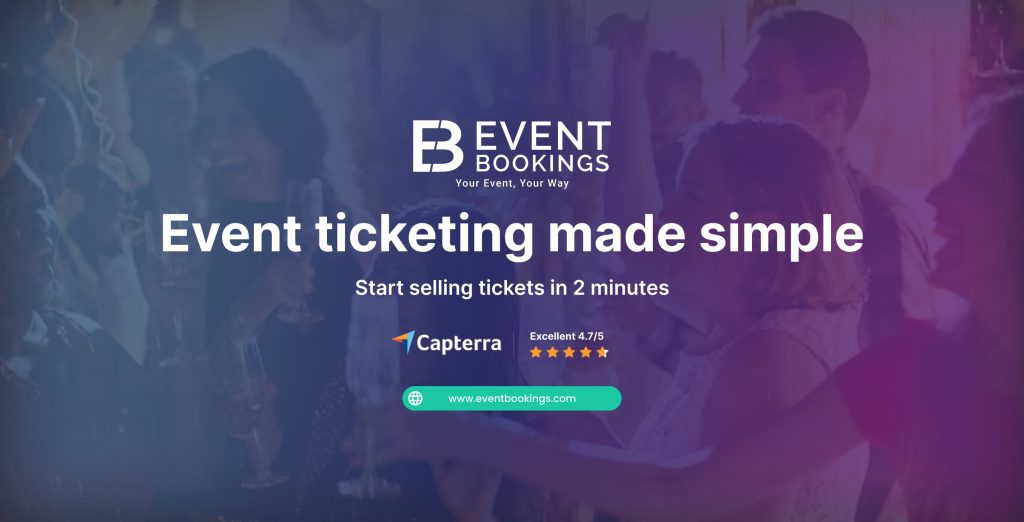
EventBookings is an essential part of the top 12 hybrid event platforms for 2025. It is a versatile platform recognised for its affordability and ease of use. It’s designed to handle events of all sizes, from small gatherings to large conferences. Hybrid virtual and in-person event bots can be executed smoothly with this feature-rich platform. One of its standout features is the ability to support multiple ticket types, including VIP, early bird, and group tickets.
The software also offers seamless integration with various marketing tools, allowing organisers to promote events through email and social media. With its affordable pricing—2% plus 30 cents per ticket in Australia and 1% plus 30 cents internationally—EventBookings is an attractive option for both local and global event planners.
Top Features
- You can create customisable event pages that can be easily created and managed with EventBookings.
- The platform is a low-cost pricing model, which makes it ideal for budget-conscious organisers.
- It supports multiple ticket types, giving flexibility for different event tiers and makes it a top choice in affordable rate.
- EventBookings has built-in marketing tools for promoting events via social media and email campaigns.
- Also supports seal-time sales tracking and reporting through its centralised dashboard.
2. Bizzabo
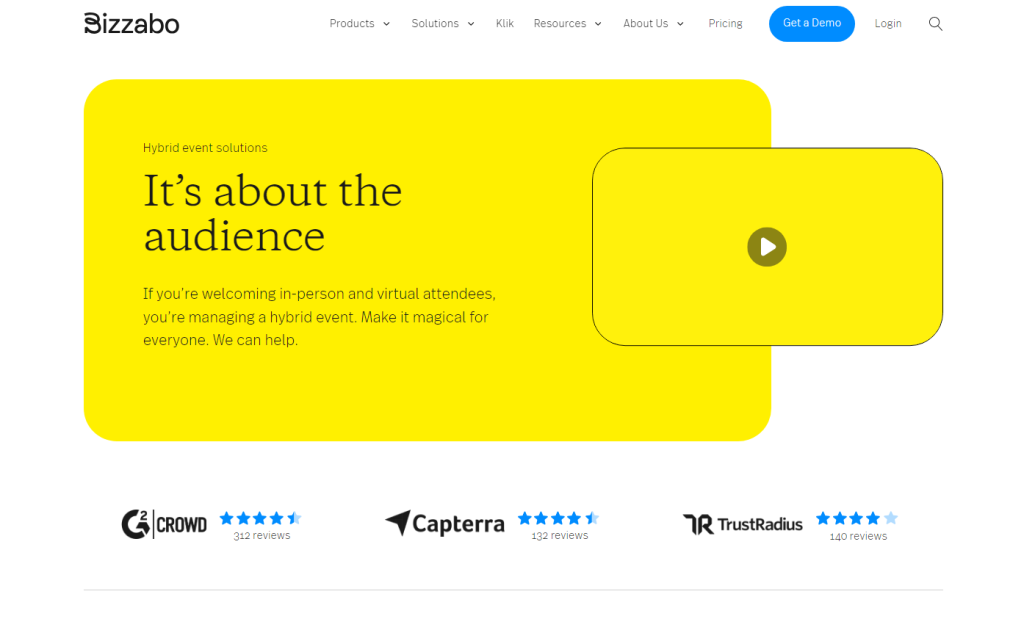
The platform Bizzabo’s characteristics and convenience of use have made it famous. A hybrid events platform needs to be integrated with the marketing stack for marketers. This software therefore provides integration with the most widely used marketing tools available. Consider HubSpot, Eloqua, and Slack. The Bizzabo suite includes an event website tool as well. This simplifies the process of creating an event page.
It isn’t always as adaptable as one might think, though. If you want to make changes, you will have to regenerate the push notification because it is difficult to update. Even the polling feature isn’t always as reliable. As a result, there is still potential for enhancement in terms of user experience.
Top Features
- With the Bizzabo mobile app—available on iOS and Android—you can provide a more customised event experience.
- Its mobile app comes with notable features like audience response systems, live polls, and networking and social media integration.
- It facilitates the conversion of on-site events into hybrid events and is simple to use.
- It offers centralised dashboard-based statistics and highlights event trends.
3. SpotMe
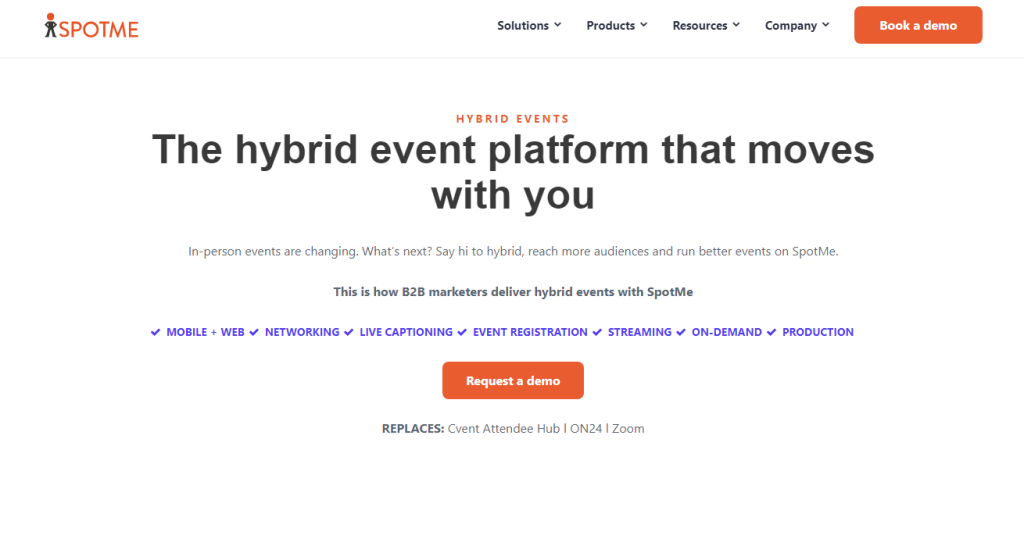
SpotMe integrates every need you have for a hybrid event. You may create branded experiences for live and on-demand content as well as the web and apps. This facilitates the creation of excellent events.
You can communicate with attendees of events both virtually and in person by using the SpotMe online and mobile apps. Interest-based matching can also help you build your community, honour the most engaged individuals, and create networking opportunities. However, consumers find it challenging to use the platform because of a steep learning curve.
Top Features
- CRM and registration platforms can be integrated with Zapier and its marketplace.
- With the help of SpotMe’s captioning, translating, and interpreting technologies, you can interact with your audience beyond linguistic and accessibility barriers.
- The platform provides an iOS and Android mobile app. From the menu to the icons, your mobile event app can be branded.
- You can use participant matching with SpotMe to assist attendees in identifying individuals they want to get to know.
4. Eventcube
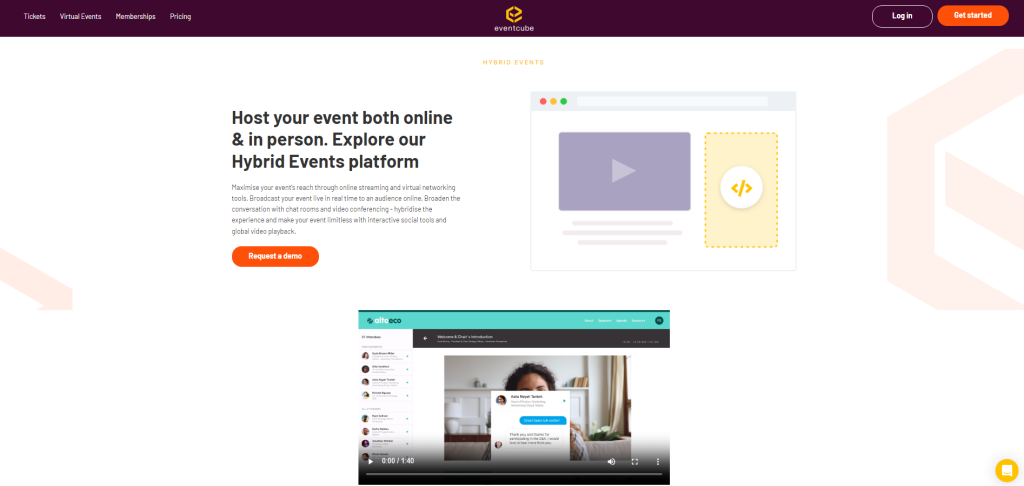
With Eventcube, you can create immersive virtual experiences and multi-channel feeds that are customised to your event’s requirements. When combined with its highly regarded ticketing system, you have an event platform that carefully attends to the demands of your guests at every stage of the interaction.
With a variety of interactive elements, Eventcube was created with the intention of encouraging audience participation. The software offers everything from state-of-the-art hybrid event management software to social media plugins, virtual polls, interactive Q&A sessions, and dynamic chat rooms. Together, these elements build a deeper bond between you and your audience and among the audience members themselves.
Top Features
- It has a dedicated ticketing system that accepts more than 100 Stripe payment methods.
- There are various possibilities for live virtual interaction in the virtual venue.
- Evencube’s pricing plan is appropriate for both special and regular events.
- The platform offers extensive data collection and detailed reporting.
5. InEvent
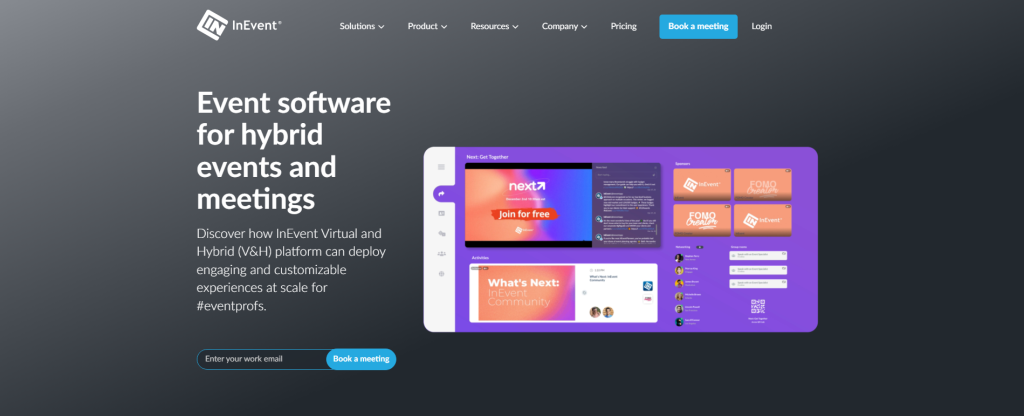
Maybe a little overstated, InEvent proudly presents itself as the best option for professional events. Unlike most event platforms, this one goes above and beyond by handling flight and lodging information. When it comes to organising incentive travel events, the platform shines. When live and virtual sessions are held concurrently, or when guests congregate in a virtual lobby for networking and sponsor contacts, the hybrid element is activated.
Furthermore, InEvent places a high value on convenience by providing mobile check-in and registration options. There is no need for additional devices—attendees only need to bring their phones. Moreover, InEvent simplifies event advertising and attendee interaction by integrating marketing tools that operate well with well-known CRM platforms.
Top Features
- InEvent provides a user-friendly online virtual lobby that emulates the atmosphere of a real-world event venue.
- The platform permits the smooth integration of third-party tools and applications via API.
- It enables lag-free, high-quality streaming for optimal audio-visual experiences
- The software makes managing attendees easier with a complete ticketing system.
6. Cvent
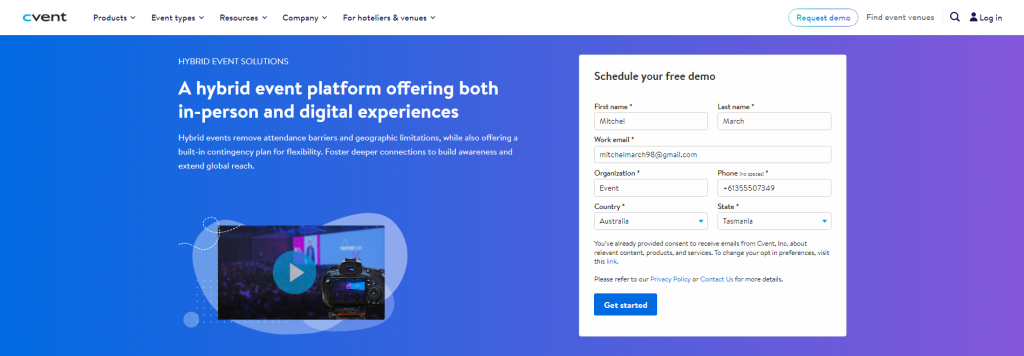
The hybrid conference platform offered by Cvent is well-known for making event registration and administration simple. It’s Event Management Platform includes features including payment tracking, email marketing, check-in apps, virtual and hybrid event solutions, and data analytics.
Cvent provides the information and insights needed to optimise your value while helping you manage every phase of the event lifecycle. It will all be on one platform for you to use. The learning curve and hourly training fees, however, are a significant disadvantage as they make it challenging for novice users to use the hybrid event software.
Top Features
- You can automate tasks related to event management with Cvent. You can utilise the built-in address to manage registrations and invitees.
- You can expand and boost attendance at any event by incorporating Internet and app-based technology with Cvent.
- Cvent provides essential information in a report that covers the entire event’s activities.
7. WebEx

A comprehensive platform for event management, Webex Events powers hybrid, in-person, and virtual events that enhance the attendance experience. Whether it’s a conference, trade show, or internal gathering, this software has the tools you need to make it a success.
Webex performs exceptionally well in the streaming domain without sacrificing flexibility. You may schedule and broadcast your material using Webex’s user-friendly features, regardless of whether you want to highlight your event on TV or combine live and pre-recorded films for enhanced freshness.
Users of the Webex hybrid conference technology, however, finds it a bit challenging to use interface and problems with in-event polling.
Top Features
- Event planners can personalise the layout, colours, and branding of their events with Webex.
- The mobile app allows for on-the-go access and is customisable.
- At the hybrid events of this platform, your audience can interact with your brand, sponsors, and one another because of its engagement opportunities.
- Webex Events, formerly known as Socio, provides a complete solution that expedites badge production and check-in procedures.
8. BigMarker

With BigMarker’s hybrid events platform, you can organise all of your speakers, exhibitors, and sessions in one place, and it will automatically build the digital touchpoints needed to interact with both virtual and in-person attendees.
More than fifteen virtual modules—basically standalone, customisable webpages—are available from BigMarker. They make it simple and exciting to construct your hybrid event by allowing you to develop your landing website, tickets, main stage, expo booth, and other hybrid meeting platforms. Event organisers are encouraged to construct their ideal event by combining multiple modules. But there are just too many extra expenses involved.
Top Features
- Participants can take part in Ask-Me-Anythings (AMAs), live Q&A sessions, and question upvoting via the event app.
- Up to nine webcams can be shared, and you can display media in your virtual events, including movies, slideshows, and your whole screen.
- Since BigMarker is web-based, managing events is simple and doesn’t involve downloads or installations.
9. Hubilo
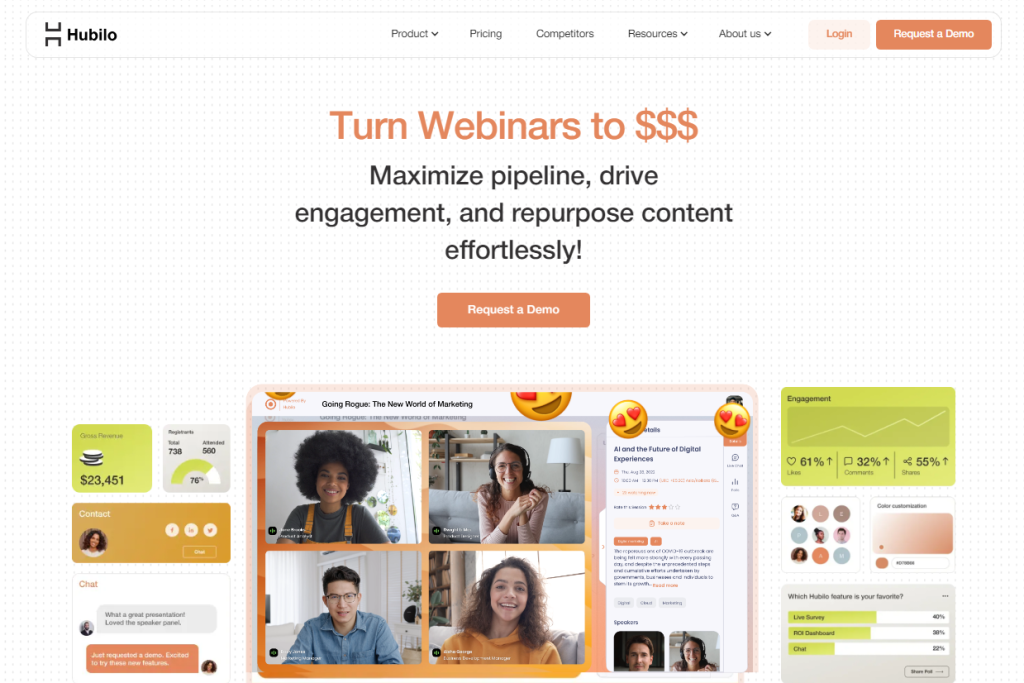
Hubilo is a hybrid events platform that helps you accomplish business goals and offers attendees exciting experiences. The gamification and engagement elements that help event planners increase audience participation are highlighted in Hubilo reviews.
In addition, Hubilo has integrations with well-known payment processors like Stripe, marketing automation platforms, and sales tools like HubSpot and Salesforce. Using the Hubilo event app, attendees can watch and interact in real-time (available for both iOS and Android). Despite the platform’s excellent features, users are unable to completely prevent feature faults.
Top Features
- Hubilo facilitates audience participation and opinion expression through interactive chats, reactions, polls, surveys, social network integrations, and other tools.
- Event planners may create an event that mirrors the style and tone of their company by utilising Hubilo’s custom branding tool.
- To make money, users can set up an event registration page where they can sell different kinds of tickets. Users can sell a variety of tickets, including discounted, free, regular, and VIP tickets.
10. Eventdex
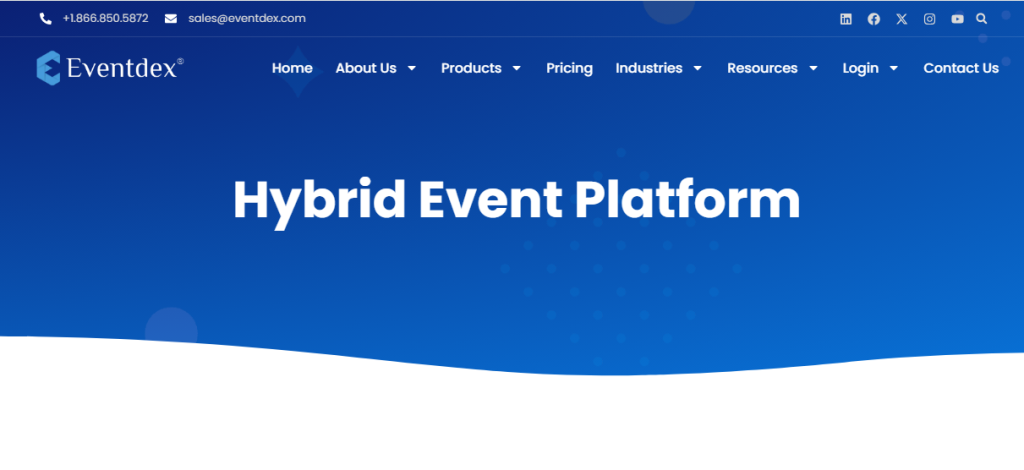
In order to effectively “manage, market, and monetise” hybrid events, Eventdex has established itself as a one-stop shop. Let’s examine the outstanding qualities that keep this promise. First off, Eventdex invites both participants in person and those participating virtually to participate in the same event with ease. A robust conferencing infrastructure and an easily navigable online registration system for guests are in place to support this smooth experience.
Additionally, the software goes above and above by providing events that are carefully selected to meet the requirements of every kind of participant. To further demonstrate its real hybrid character, Eventdex offers the unusual option for no-shows to access recorded content whenever it suits them.
Top Features
- Evendex is a powerful tool for obtaining leads and maximising networking possibilities.
- It matches guests with similar interests using AI-powered matchmaking.
- The platform simplifies event registration through a user-friendly system and interface.
- This software system supports a mobile event app, enabling device accessibility.
11. Stova

Hundreds of brands can plan thrilling virtual, real, and hybrid events that foster international connections with Stova’s event management platform. It is easy to use for event organisers and includes features like guest registration. Stova’s greatest strength is its capacity to turn ordinary events into templates. As a result, you may unwind knowing that planning a hybrid event won’t need you to start from scratch.
Additionally, Stova’s technology is compatible with HubSpot, Marketo, and Salesforce, among other third-party applications. Stova uses cutting-edge analytics and data processing to assist users in enhancing events. But because Stova is pricier than most, people might search for more affordable alternatives.
Top Features
- Users can integrate their preferred content and services into a branded mobile app offered by Stova.
- Stova’s integrated on-site hardware technology allows you to create a hybrid or secure on-site event space.
- Stova helps people make better use of past, present, and future occurrences by utilising advanced data processing and analytics.
12. EventMobi
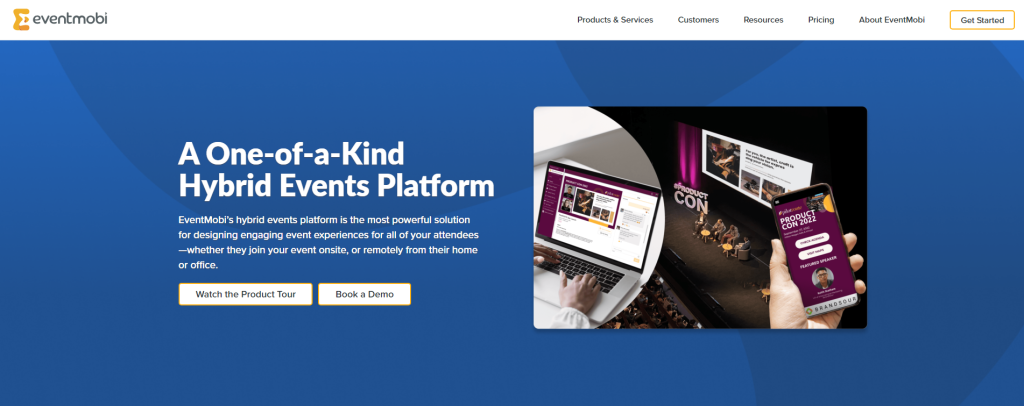
Well-known hybrid event platform EventMobi offers gamification features, Q&A sessions, and surveys. The platform distinguishes itself from other choices with its versatility. Additionally, it makes integration with popular platforms like Salesforce and Marketo easier.
Event coordinators may use the particular solution to design websites, send out email invites, gather registrations, and oversee the entire online check-in procedure. With the ability to customise an online area for various conferences, EventMobi’s virtual space offers live feeds and video-on-demand.
Top Features
- You may segment your email list and invite specific individuals by using EventMobi to generate invitation lists.
- With EventMobi’s registration function, you can design any kind of registration experience you’d like thanks to a powerful and integrated backend.
- You can provide your guests a personalised mobile event app experience with EventMobi, which places networking, interactivity, content, and navigation at their fingertips.
Final Words
You now have it! This concludes our thorough analysis of the top hybrid events platform for 2025 exploration.
While each of the 12 is a strong candidate in the category, they all have advantages and disadvantages. Using this resource, we invite you to evaluate your options based only on your objectives and event requirements. For our final suggestions we advise in the event that you’re still unsure, always choose the option with the most flexibility.




